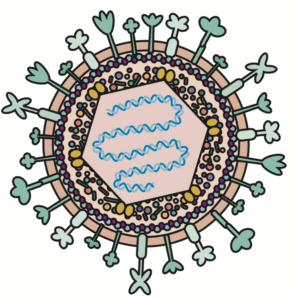

Neonatal infections with herpes simplex viruses, which occur by virus transmission from the mother during childbirth or in the early postnatal period, can have serious consequences, including disseminated disease or encephalitis in half of infected newborns. Even when treated with antiviral drugs, such infections can lead to neurological deficits.
Mothers who have antibodies to herpes simplex viruses are less likely to transmit infections to babies than mothers who have been recently infected. The difference is due to the transfer of maternal IgG antibody to the fetus, which protects against infection. Furthermore, neutralizing antibodies to herpes simplex viruses 1 and 2 are effectively transferred from mother to fetus. In mice, passive transfer of serum from immunized mice to pregnant mice prevented lethal disease after inoculation of pups with herpes simplex virus. These observations suggest that immunization of pregnant women with a herpes simplex virus vaccine might protect offspring from serious infections.
To test this idea, pregnant mice were immunized by intramuscular inoculation with a replication-defective herpes simplex virus 2. Both dams and offspring had antibodies to multiple viral proteins in serum as well as in the trigeminal ganglia – the site of herpes simplex virus latency. When challenged with lethal doses of herpes simplex virus 1 or 2, pups born to immunized dams had reduced virus in the central nervous system and survived. In contrast, pups born to unimmunized dams succumbed to infection.
Because neonatal herpes simplex virus infections can have neurological consequences, mice were subjected to the open field test to measure anxiety-like behavior. Offspring of uninfected dams challenged with a low dose of herpes simplex virus 1 showed thigmotaxis, a tendency to remain close to the walls of the mouse cage. In contrast, offspring of infected dams showed normal behavior after infection. These observations show that even a low dose of herpes simplex virus can cause abnormal behavior in mice, which can be prevented by immunization of dams.
These findings suggest that other neonatal infectious diseases, which occur too early in life to be stopped by immunization, might be prevented by immunizing the pregnant mother. Besides herpes simplex virus infections, acquired at birth or shortly thereafter, this approach might also be applicable to prevent respiratory syncytial virus infections, which typically occur in the first few months of life. In addition, maternal immunization against viruses acquired in utero by transplacental passage of virus from mother to fetus – including cytomegalovirus and Zika virus – might also be of benefit to the fetus.
As the authors write, the maternal virome is likely an important determinant of human health. Thanks, Mom.
[For more discussion of this paper, listen to Immune #19]

Pingback: Immunize mother to protect baby - Virology Hub
Yes. We should. But it should be no earlier than 5 weeks. This will skip past the developmental window in notochord development during which activation changes brain development. Patterson started with rats creating a reproducible model and continued to rhesus.
Placental regulation of maternal-fetal interactions and brain development. https://www.ncbi.nlm.nih.gov/pubmed/22753006
Activation of the maternal immune system during pregnancy alters behavioral development of Rhesus monkey offspring. https://www.ncbi.nlm.nih.gov/pubmed/24011823
Maternal immune activation causes age- and region-specific changes in brain cytokines in offspring throughout development. https://www.ncbi.nlm.nih.gov/pubmed/22841693
The Evolution oNeuroimmunology in Brain Development and Disease. https://www.ncbi.nlm.nih.gov/pmc/articles/PMC4357356/
Maternal immune activation yields offspring displaying mouse versions of the three core symptoms of autism. https://www.ncbi.nlm.nih.gov/pubmed/22310922
Etc.. http://www.bbe.caltech.edu/people/paul-h-patterson
Patterson did excellent work in this area. His model saw the same results from infection, vaccination, activation with RNA injections, etc.. Consistent and reproducible. He started with the observation of the window in which thalidomide appeared to cause autism.